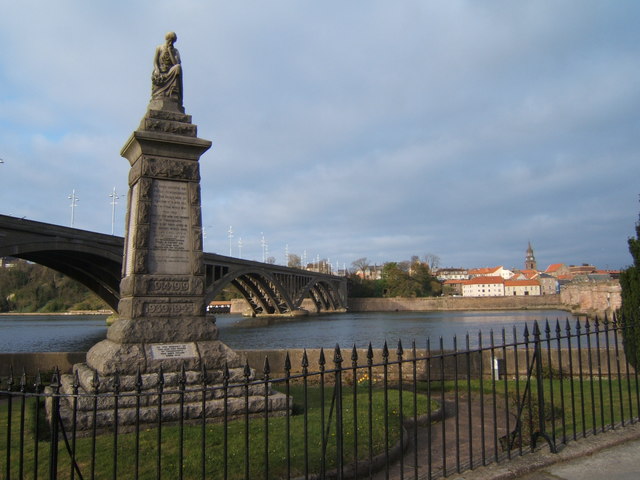Thomas Grey (poet) on:
[Wikipedia]
[Google]
[Amazon]
Thomas Grey (1863–1928) was an
 Grey was the instigator of the erection of the Tweedmouth War Memorial (on which 111 men are commemorated) and founder member of the group promoting a fund for the remaining money needed for the erection of the Memorial in July 1921.
Grey was the instigator of the erection of the Tweedmouth War Memorial (on which 111 men are commemorated) and founder member of the group promoting a fund for the remaining money needed for the erection of the Memorial in July 1921.
English
English usually refers to:
* English language
* English people
English may also refer to:
Peoples, culture, and language
* ''English'', an adjective for something of, from, or related to England
** English national ide ...
poet
A poet is a person who studies and creates poetry. Poets may describe themselves as such or be described as such by others. A poet may simply be the creator ( thinker, songwriter, writer, or author) who creates (composes) poems (oral or writte ...
who wrote about his local area of the Scottish Borders
The Scottish Borders ( sco, the Mairches, 'the Marches'; gd, Crìochan na h-Alba) is one of 32 council areas of Scotland. It borders the City of Edinburgh, Dumfries and Galloway, East Lothian, Midlothian, South Lanarkshire, West Lothi ...
, the First World War
World War I (28 July 1914 11 November 1918), often abbreviated as WWI, was one of the deadliest global conflicts in history. Belligerents included much of Europe, the Russian Empire, the United States, and the Ottoman Empire, with fightin ...
and rail transport
Rail transport (also known as train transport) is a means of transport that transfers passengers and goods on wheeled vehicles running on rails, which are incorporated in tracks. In contrast to road transport, where the vehicles run on a p ...
.
Life and railway work
Thomas Grey was born on 16 September 1863 at Shoreswood,Norham
Norham ( ) is a village and civil parish in Northumberland, England, It is located south-west of Berwick on the south side of the River Tweed where it is the border with Scotland.
History
Its ancient name was Ubbanford. Ecgred of Lindisfarne ( ...
, in Northumberland. He worked on trains for much of his life for the North Eastern Railway.
On 3 July 1887 he married Esther Glenwright at South Shields
South Shields () is a coastal town in South Tyneside, Tyne and Wear, England. It is on the south bank of the mouth of the River Tyne. Historically, it was known in Roman times as Arbeia, and as Caer Urfa by Early Middle Ages. According to the 20 ...
and they resided in Berwick-upon-Tweed
Berwick-upon-Tweed (), sometimes known as Berwick-on-Tweed or simply Berwick, is a town and civil parish in Northumberland, England, south of the Anglo-Scottish border, and the northernmost town in England. The 2011 United Kingdom census recor ...
.
Grey died on 14 August 1928 and is buried in Tweedmouth
Tweedmouth is part of the town of Berwick-upon-Tweed in Northumberland, England. It is located on the south bank of the River Tweed and is connected to Berwick town centre, on the north bank, by two road bridges and a railway bridge. Tweedmouth ...
Cemetery.
Poetry
Grey was variously known as the ''Border Poet'', ''Engine Driver Poet'' and ''Footplate Poet''. Much of his output appeared in the local press and was never independently published during his lifetime. He was one of the best known writers of Border Poetry, and for some years he was the writer of Tweedmouth Topics in a Border Newspaper, relinquishing this post due to illness in the last 20 years of his life. He also wrote in “The Wheatsheaf” (the Co-operative Movement’s Official Magazine). In 1916 he was honoured for his work by being made a Fellow of the International Institute of British Poetry. In November 1916, at the request of the Royal Normal College in London (now known as TheRoyal National College for the Blind
The Royal National College for the Blind (RNC) is a co-educational specialist residential college of further education based in the English city of Hereford. Students who attend the college are aged 16 to 25 and blind or partially sighted. ...
), Grey sent them 200 copies of his “effusions” which were then printed in Braille type.
Publications
* ''Musings on the Footplate'', 1906, printed by Martins the Printers, Berwick-upon-Tweed * ''Poems on the Great War'', (posthumously) March 2015, printed by Martins the Printers, Berwick-upon-TweedAchievements
*President of the Tweedmouth Co-operative Society. *Secretary of the Tweedmouth Ratepayers Association. *Founder Member of the NER Pensions Society. *Founder Member and First President of the Tweedmouth Burns Club. *Member of the St Andrews & St Johns Ambulance *Freemason attached to a Dunbar Lodge. Grey was the instigator of the erection of the Tweedmouth War Memorial (on which 111 men are commemorated) and founder member of the group promoting a fund for the remaining money needed for the erection of the Memorial in July 1921.
Grey was the instigator of the erection of the Tweedmouth War Memorial (on which 111 men are commemorated) and founder member of the group promoting a fund for the remaining money needed for the erection of the Memorial in July 1921.
References